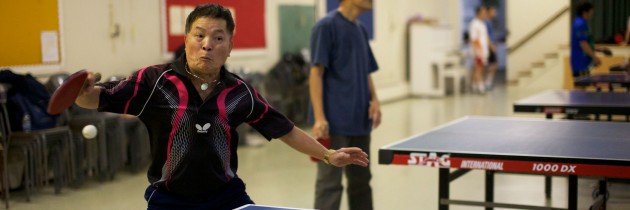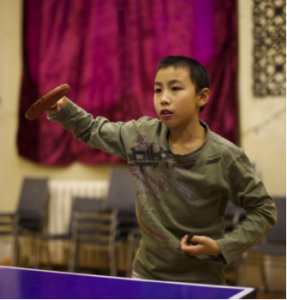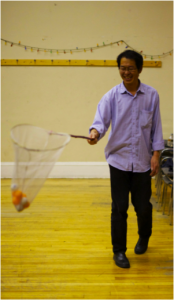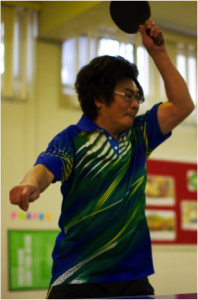Chinese community brings generations together at the ping-pong table
By Paige Parsons and Fangliang Xu
Hechun Ouyang says his mother forced him to attend his first table tennis lesson 10 weeks ago. At the time, he didn’t know what to expect. At school his friends played basketball and soccer. Nobody played ping-pong.
His mother, Shirley Fang, enrolled her 10-year-old son in a series of the lessons offered by the Chinese-Canadian Heritage Centre because she thought becoming involved in a traditional Chinese sport would give him an opportunity to do something his school friend’s weren’t. However, Ouyang was not interested. Why would he want to play a game that none of his friends were playing?
Now that he has been playing for a while, Ouyang says he has warmed up to table tennis—commonly known as ping-pong. Although he wants to keep improving, Ouyang says he will probably just play with his friends or maybe in a small club, for now.
As for his mother, she’s just happy he gave the sport and its connection to Chinese culture a try.
The Chinese-Canadian Heritage Centre club holds table tennis lessons for children once a week at the First United Church, at Kent and Florence Streets. Two professional coaches instruct children in the basics of the game: posture, footwork, backhand and forehand.
Parents watch from the side or, more often than not, volunteer to use an over-sized butterfly net to scoop up bouncing, stray balls that roll off the tables onto the floor around the room. One of the coaches, Lijuan Geng, is a former women’s table tennis world champion from China. Geng started teaching children’s table tennis in Ottawa eight years ago. In the beginning, she taught only 10 children. Now she coaches over 200 Chinese-Canadian youth across the city.
“Many Chinese parents want their children to learn ping-pong as a way of becoming involved in Chinese culture,” Geng said. “Ping-pong is a vehicle of Chinese culture. It represents hard work.”
According to Geng, the table tennis phenomenon is catching on in the wider Ottawa community. She will be leading the first table tennis lesson ever taught in a public elementary school in Barrhaven this Thursday.
The table tennis club at the Chinese-Canadian Heritage Centre originally began offering lessons as a way to bring in extra cash for their non-profit organization. Shupang Chou, the organizer of the centre, said he figured Chinese parents would want their children to have an opportunity to learn the traditional sport that is so popular back home.
In April 2013, the centre hired Geng and kicked off the first round of lessons, with each round running for 10 weeks. Only 10 students signed up during the first two rounds, Chou said. Within a year, that number doubled.
While most of the students are still beginners, some adults around town have been playing table tennis for as long as these children—and maybe even the children’s parents—have been alive.
The Chinese Table Tennis Club, located in a basement in Ottawa’s west end, is a popular hub for these adults. Club members plays three times a week for up to four hours.
According to Wowei Wang, 62, one of the club’s founding members, the club only had 10 members when it was created in 1982. During the following decade, most of the people who joined were Cantonese immigrants from Hong Kong.
During the 1990s, immigrants from the Chinese mainland as well as other immigrants and Canadians began to enrol in the club. The club now has 51 members, nearly half of whom are Chinese.
Given the increase in members and limited space, the club had to invent a system to help keep playing times fair. Each pair of players gets 22 minutes at a table. At the end of 22 minutes, a timer goes off and the next players are up.
Wang says the system caters to what most members are looking for: a good way to stay fit. Members pay $4 to participate in the whole practice, which breaks down to $1 for an hour of table tennis.
For Vincent Chan, a member of the club since 1987, the $4 is well worth the chance to stay healthy and connect with his community. Back when he first joined the club, Chan says joining the club gave him an opportunity to make new friends and to feel more at home.
“You’re all alone in a new country,” Chan said. “That was one way to get in touch with the Chinese community.”
Youngsters like Ouyang may not plan to become table tennis stars. But coaches and organizers in the centre say they’ll promote table tennis in the city as long as the community wants to use the sport to inspire a connection to China.
Click the photo below to view a photo slideshow.






